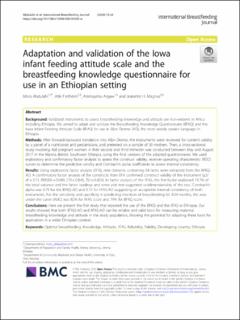| dc.description.abstract | Background: Validated instruments to assess breastfeeding knowledge and attitude are non-existent in Africa including Ethiopia. We aimed to adapt and validate the Breastfeeding Knowledge Questionnaire (BFKQ) and the Iowa Infant Feeding Attitude Scale (IIFAS) for use in Afan Oromo (AO), the most widely spoken language in Ethiopia. Methods: After forward-backward translation into Afan Oromo, the instruments were reviewed for content validity by a panel of a nutritionist and pediatricians, and pretested on a sample of 30 mothers. Then, a cross-sectional study involving 468 pregnant women in their second and third trimester was conducted between May and August 2017 in the Manna district, Southwest Ethiopia, using the final versions of the adapted questionnaires. We used exploratory and confirmatory factor analysis to assess the construct validity, receiver operating characteristic (ROC) curves to determine the predictive validity and Cronbach’s alpha coefficients to assess internal consistency. Results: Using exploratory factor analysis (EFA), nine domains containing 34 items were extracted from the BFKQAO. A confirmatory factor analysis of the constructs from EFA confirmed construct validity of the instrument (χ2/ df = 2.11, RMSEA = 0.049, CFI = 0.845, TLI = 0.823). In factor analysis of the IIFAS, the first factor explained 19.7% of the total variance and the factor loadings and scree plot test suggested unidimensionality of the tool. Cronbach’s alpha was 0.79 for the BFKQ-AO and 0.72 for IIFAS-AO suggesting an acceptable internal consistency of both instruments. For the sensitivity and specificity in predicting intention of breastfeeding for ≥24 months, the area under the curve (AUC) was 82% for IIFAS score and 79% for BFKQ score. Conclusions: Here we present the first study that reported the use of the BFKQ and the IIFAS in Ethiopia. Our results showed that both BFKQ-AO and IIFAS-AO can be reliable and valid tools for measuring maternal breastfeeding knowledge and attitude in the study population, showing the potential for adapting these tools for application in a wider Ethiopian context. Keywords: Optimal breastfeeding, Knowledge, Attitude, IIFAS, Reliability, Validity, Developing country, Ethiopia | |
